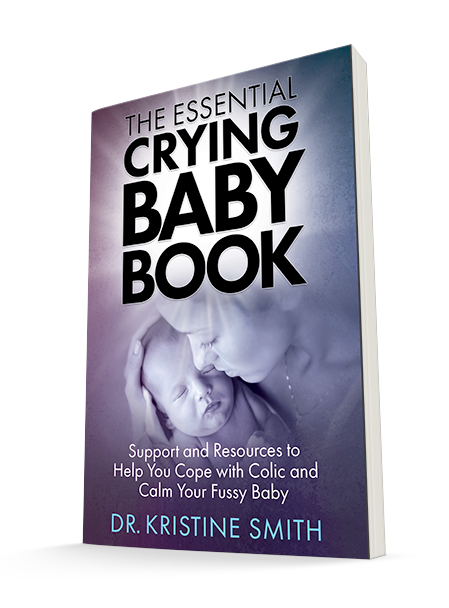I noticed the change pretty abruptly.
It began just days after my mom had left to return to Maine. She had stayed with us for a couple of weeks to help after the baby was born. I wondered if the baby’s change in behavior was because she sensed my anxiety over my mom leaving. I was still pretty immobile from my C-section, and I loved having my mom around for support. But things had been going well. Our baby was beautiful and peaceful and perfect. Then everything changed.
Katiya’s naps abruptly stopped and were replaced by a constant irritable fussing.
As the days passed the crying became worse, and eventually turned into outright screaming. And it was happening all the time.
At first, we wondered if perhaps her behavior was a normal phase. But both from what I read and what mom friends were telling me, newborns were meant to sleep a lot, while prolonged episodes of fussiness weren’t as typical until the second month. At only a few weeks of age, she stopped sleeping for any good length of time, day or night, which amplified her distress. Her constant anguish seemed unrelated to any cause such as a dirty diaper, gassiness, hunger, or overstimulation. It was soon clear that what we were witnessing was anything but normal. We tried everything to put her at ease. Nothing was working.
We went through food trials, tried gripe water and treatments for excess gas, every soothing technique in the book – nothing helped.
When our pediatrician finally diagnosed Kati with colic, we were relieved to finally place a label on her condition.
Unfortunately though, it gave us little in terms of understanding why it was happening or what we could do to stop it.
Day after day, the ceaseless cries filled me with agony and a sense of hopelessness. I questioned my ability to properly soothe my baby. I wondered what kind of mother I must be for my baby not to be consoled by my love and whole-hearted comforting efforts. It began to feel like a perpetuity of torture with no end in sight. I went from wanting to console her when she screamed to wanting to just get away from her. Nothing I did seemed to help her anyway. She didn’t want me, and I began to resent her.
It’s still difficult for me to fully comprehend all the feelings I experienced when this was happening to us – exhaustion, depression, anger, fear, shame, guilt, self-doubt – or if I have since suppressed some of them, but let me just say, it was a dark time. What I remember most was an unrelenting sense of pure desperation. I would tell myself over and over again: Just make it to three months and then it will stop. Just make it to three months. But three months seemed like a lifetime away.
Of course, we didn’t know what we were in for as first time parents; caring for any newborn can be difficult.
But for parents of babies with colic, it is much, much harder.
There is no soothing, no quiet cuddle time, no naptime, no peace, and no semblance of a schedule for months. There is only inconsolable crying and eternal bouncing, rocking and swaying. For a mom, it is a traumatic experience. It sounds crazy, but severe colic can cause long-term damage to a new mother’s self-confidence to parent and to her long-term relationship bond with her baby. I have been there, and I don’t even think I understood what was happening to me emotionally.
If you are going through or have survived the colic experience, but have been unable to recover mentally (even sometimes in subtle ways), perhaps finding difficulty bonding with your child in the aftermath of the storm – recognizing the impacts of your experience is the first step to correcting course, and finding your self-confidence and ability to forgive yourself and your baby for what was not anyone’s fault.


